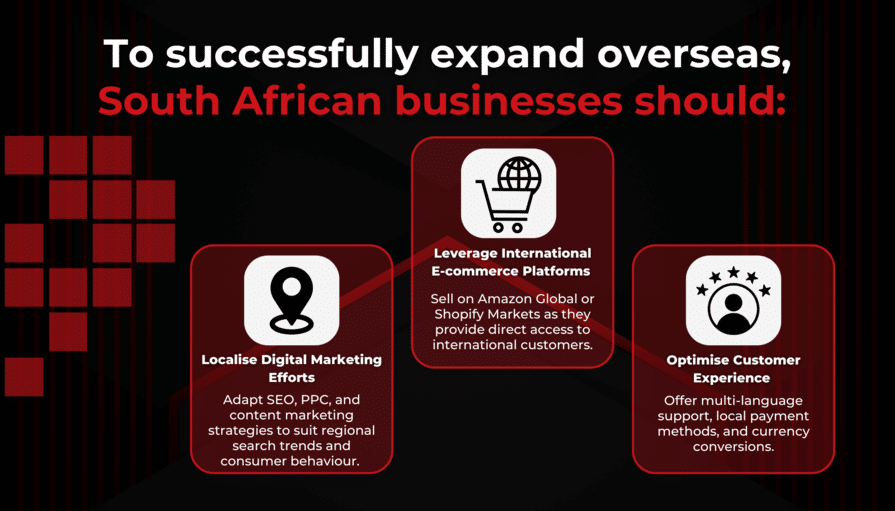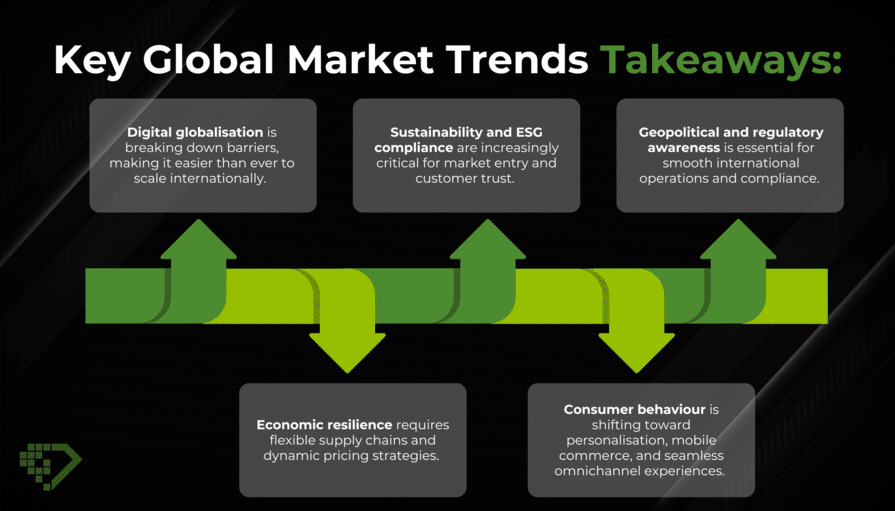As South African businesses look beyond local markets for growth, global expansion offers exciting opportunities – but also unique challenges. Economic shifts, digital transformation, and evolving consumer behaviour are reshaping international trade, making it more important than ever for businesses to stay ahead of global market trends.
Expanding into international markets takes a well-planned strategy that considers digital globalisation, economic resilience, and changing consumer preferences. Whether you’re a growing startup or an established brand ready to scale internationally, understanding global market insights will help you navigate uncertainty, mitigate risks, and unlock new opportunities.
Let’s explore the key global trends shaping 2025 and how South African businesses can position themselves for international success!

The Acceleration of Digital Globalisation
Trend Insight:
The rise of cross-border digital trade has made it easier than ever for South African businesses to expand into international markets. Global e-commerce sales are projected to surpass $6.56 trillion by 2025, and with fewer barriers to entry, businesses can scale faster without a physical presence overseas.
At the same time, digital-first strategies are levelling the playing field, allowing small and mid-sized businesses to compete globally without the need for large-scale infrastructure.
Strategic Adaptation:
To successfully expand overseas, South African businesses should:
- Localise digital marketing efforts – Adapting SEO, PPC, and content marketing strategies to suit regional search trends and consumer behaviour increases visibility and engagement.
- Leverage international e-commerce platforms – Selling on Amazon Global, Alibaba, or Shopify Markets provides direct access to international customers without high operational costs.
- Optimise customer experience for global audiences – Offering multi-language support, local payment methods, and currency conversions helps build trust and increase conversion rates.
By adopting digital-first expansion strategies, South African businesses can scale internationally with fewer barriers and reach global customers faster. Learn more about our specialised ecommerce solutions.

Economic Shifts, Global Logistics Market Trends & Inflationary Pressures
Trend Insight:
Rising inflation, supply chain disruptions, and fluctuating exchange rates are reshaping global logistics. For South African businesses looking to expand, these economic shifts can impact profit margins, pricing strategies, and sourcing options.
However, some international markets remain resilient and high-growth, presenting expansion opportunities for businesses that are strategic about their market selection.
Strategic Adaptation:
To navigate these global logistics market trends and economic challenges, South African businesses should:
- Diversify supply chains to reduce reliance on a single market – Expanding supplier networks can help mitigate risks from geopolitical tensions and currency fluctuations.
- Adopt flexible pricing strategies – Using dynamic pricing models can help businesses adjust for inflation and changing exchange rates while remaining competitive.
- Target high-growth, low-inflation markets – Expanding into economically stable regions provides greater security and long-term profitability.
The Rise of Sustainable Business Models
Trend Insight:
Sustainability is becoming a key differentiator in global markets. Studies show that over 68% of international consumers prefer brands with strong sustainability initiatives, and governments are tightening Environmental, Social, and Governance (ESG) regulations for imported goods and services.
Strategic Adaptation:
To remain competitive in eco-conscious global markets, businesses should:
- Incorporate sustainability into branding – Positioning as an eco-friendly or socially responsible brand can increase credibility and attract global consumers.
- Optimise supply chains for environmental compliance – Reducing carbon footprints, using sustainable materials, and partnering with ethical suppliers can improve both efficiency and market access.
- Leverage sustainability incentives – Many countries offer tax benefits, grants, and incentives for businesses adopting green initiatives, making sustainability an opportunity rather than a challenge.
For South African companies aiming to break into global markets, sustainability isn’t just good ethics, it’s good business!
Changing Consumer Behaviour in Global Markets
Trend Insight:
Consumer behaviour is shifting rapidly, with a strong move toward digital-first, experience-driven commerce. More shoppers rely on mobile commerce, and AI-driven personalisation is influencing buying decisions. In fact, global studies show that more than 50% of online purchases now happen via mobile, and consumers expect seamless, personalised experiences across multiple touchpoints.
For South African businesses expanding internationally, understanding regional shopping habits and adapting marketing strategies accordingly is essential to gaining traction in foreign markets.
Strategic Adaptation:
To successfully engage international consumers, businesses should:
- Invest in AI-driven marketing strategies to create personalised shopping experiences tailored to different markets.
- Optimise omnichannel marketing by ensuring a smooth transition between digital, mobile, and in-store experiences.
- Understand market-specific payment preferences and integrate local online marketplaces where consumers are most active.
The Geopolitical & Regulatory Landscape
Global Market Insights:
Expanding into new markets means navigating complex trade regulations and data protection laws. Global trade policies are shifting, fast. US-China trade restrictions, the EU Digital Markets Act, and evolving GDPR and POPIA-style data privacy laws are impacting how businesses collect, store, and use consumer data. South African businesses planning international expansion must be aware of these regulations to avoid compliance issues and market entry barriers.
Strategic Adaptation:
To successfully operate in new markets, businesses should:
- Ensure compliance with regional data protection laws before expanding into international territories.
- Develop agile expansion strategies that account for potential regulatory shifts and political uncertainties.
- Monitor trade agreements and international business policies to identify opportunities for smoother market entry.
Key Global Market Trends Takeaways:
- Digital globalisation is breaking down barriers, making it easier than ever to scale internationally.
- Economic resilience requires flexible supply chains and dynamic pricing strategies.
- Sustainability and ESG compliance are increasingly critical for market entry and customer trust.
- Consumer behaviour is shifting toward personalisation, mobile commerce, and seamless omnichannel experiences.
- Geopolitical and regulatory awareness is essential for smooth international operations and compliance.

Expand Smarter with RubyLeads©
As businesses grow beyond South African borders, tracking lead performance and marketing effectiveness becomes even more important. RubyLeads© helps businesses monitor and optimise international lead generation efforts, ensuring that expansion strategies are backed by real data.
Ready to take your business global?



